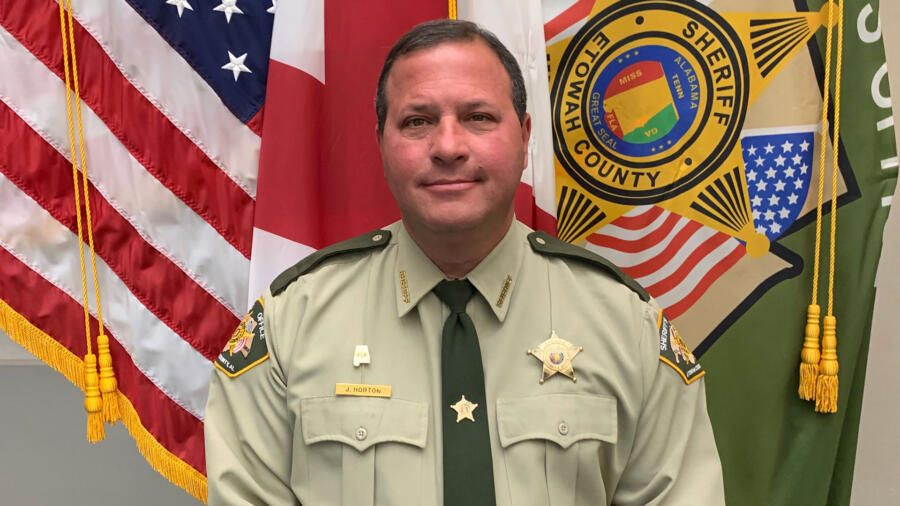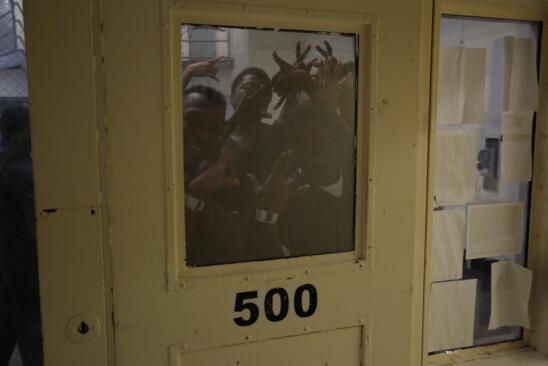County Sheriff Jonathon Horton has followed an interesting and unique career path, ultimately landing on Season 6 of 60 Days In, at the Etowah County Detention Center, in Alabama. He spoke with A&E True Crime about his journey from the Navy to Etowah County, and the eye-opening nature of his department’s 60 Days In experience.
Tell us about your journey to become County Sheriff.
In 1992, I followed in my grandfather’s footsteps and joined the Navy, in San Diego. I did my four years, and my father, who was in the family mortuary business, had opened a new funeral home. I went to mortuary college and began to manage that funeral home, but I missed the military. I joined the Alabama Army National Guard and spent five years there.
Right after September 11, my guard unit in Alabama got activated to a year of active duty, and I was converted to military police. That’s when I got interested in law enforcement—it was sort of like a bug bit me. I worked my way from patrol, the first year, to criminal investigations. I was a narcotics agent, too, and pretty much everything except for a dispatcher and correctional officer.
When did you make the leap to more supervisory roles?
Some years later, I got to apply for the chief of police position at Glencoe, which was a small department of six men [where I was assistant chief]. I was able to grow that department to eight men. Then a bigger town, Rainbow City, had an unexpected opening in a department of 32, in 2016. I wanted to see what kind of impact I could make there, and I had a lot of success as chief. Then, as the sheriff’s election was approaching, I decided to throw my name in the hat. I ran against a 37-year veteran of the sheriff’s office, and we had a good outcome in 2018.
When you first came on board as Etowah County’s sheriff, you ran a big shakedown for contraband. Tell us what you found.
I had worked there under the previous sheriff, and it was very well maintained and run. You could literally eat off the floor. Still, I knew the place had huge retention issues. [They were] hiring 20 officers a month, there were broken door locks—the facility had really degraded. Now, I thought there might be 50 broken door locks. I had no idea there were 212. I thought there might be a couple of hundred pounds of contraband, but nowhere near the 5,000 pounds that we found.
What else did you learn?
In my first week, I had a couple of parents come to me, saying their 19- or 20-year-old had been to jail for a couple of months, and they said, ‘Hey, they’ve been smoking marijuana, but they did heroin for the first time in the Etowah County Jail.’ That hurt, because, as a corrections facility where we try to correct people and send them back to society, [it was tough] to learn that heroin was making its way into the jail—and then to learn from the first shakedown that the cameras weren’t working for three years, the doors didn’t lock, the windows were open.
No wonder the drugs and things were getting into the facility! So that was quite overwhelming, to find all that, especially with no background in corrections. Fortunately I’ve had good staff, and this program, truly, the bad that it may show brought the good of where we are today.
What improvements have you implemented?
The windows are fixed; the doors are fixed; the locks are fixed. [We have a] new x-ray machine—$150,000. Retention went up the last three or four months; instead of hiring 20 a month, [we hired] three a month. We had a full slate of people in the last month and a half, and got a three-step raise for the correctional officers. We saw a tremendous amount of change in 10 months, and 90% of it has [been a result of] what we learned on this program.
Did you learn anything from the show before you were part of it?
I had never heard of 60 Days In until I participated in it [laughing]. I’ve learned a lot through our experiences, though. We even had correctional officers who had been there 20 years, who had learned things that were happening that we never knew about—like inmates using the commissary kiosk to pass messages, and things of that nature. We were able to [disrupt] those things, and change those mechanisms to stop that from happening.
What do you think is important about 60 Days In?
What’s important to me is where it showed our inadequacies and the things we needed to improve—which I would have never seen any other way.
Related Features:
Watch Full Episodes of ’60 Days In,’ No Sign In Required
Sheriff Mark Lamb of ’60 Days In’ on the Pinal County Jail’s Biggest Challenges
What It’s Like to Work an iPhone After Being in Prison for 25 Years
The Illegal Drug Highway Decimating the Midwest
How Inmates Help Solve Cold-Case Murders While Playing Cards


